
Sir Edmund "Toby" Barton, was an Australian politician and judge who served as the first prime minister of Australia from 1901 to 1903, holding office as the leader of the Protectionist Party. He resigned to become a founding member of the High Court of Australia, where he served until his death.

Alfred Deakin was an Australian politician who served as the second Prime Minister of Australia. He was a leader of the movement for Federation, which occurred in 1901. During his three terms as prime minister over the subsequent decade, he played a key role in establishing national institutions.
The Protectionist Party or Liberal Protectionist Party was an Australian political party, formally organised from 1887 until 1909, with policies centred on protectionism. The party advocated protective tariffs, arguing it would allow Australian industry to grow and provide employment. It had its greatest strength in Victoria and in the rural areas of New South Wales. Its most prominent leaders were Sir Edmund Barton and Alfred Deakin, who were the first and second prime ministers of Australia.

The Barton ministry (Protectionist) was the 1st ministry of the Government of Australia. It was led by the country's 1st Prime Minister, Sir Edmund Barton. The Barton ministry was formed on 1 January 1901 when Federation took place. The ministry was replaced by the First Deakin ministry on 24 September 1903 following Barton's retirement from Parliament to enter the inaugural High Court.

The Watson ministry (Labour) was the 3rd ministry of the Government of Australia, and the first national Labour government formed in the world. It was led by the country's 3rd Prime Minister, Chris Watson. The Watson ministry succeeded the First Deakin ministry, which dissolved on 27 April 1904 after Labour withdrew their support and Alfred Deakin was forced to resign. The ministry was replaced by the Reid ministry on 17 August 1904 after the Protectionist Party withdrew their support over the Conciliation and Arbitration Bill.

The Reid ministry was the 4th ministry of the Government of Australia. It was led by the country's 4th Prime Minister, George Reid. The Reid ministry succeeded the Watson ministry, which dissolved on 17 August 1904 after the Protectionist Party withdrew their support and Chris Watson was forced to resign. Due to having to rely on the Protectionists to retain office, half of the ministry was forced to accommodate conservative Protectionists - leading to the government to sometimes be referred to as the Reid-McLean Ministry. The ministry was replaced by the Second Deakin ministry on 5 July 1905 after the Protectionists withdrew their support and returned to office with the support of the Labour Party.
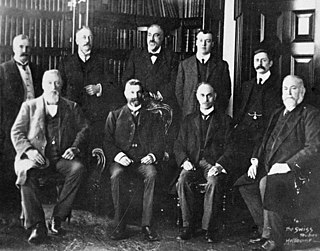
The Second Deakin ministry (Protectionist) was the 5th ministry of the Government of Australia. It was led by the country's 2nd Prime Minister, Alfred Deakin. The Second Deakin ministry succeeded the Reid ministry, which dissolved on 5 July 1905 following the resignation of George Reid after the Protectionists withdrew their support and gained support from the Labour Party. The ministry was replaced by the First Fisher ministry on 13 November 1908 after the Labour Party withdrew their support and formed their own minority government.

The Third Deakin ministry (Liberal) was the 7th ministry of the Government of Australia. It was led by the country's 2nd Prime Minister, Alfred Deakin. The Fourth Deakin ministry succeeded the First Fisher ministry, which dissolved on 2 June 1909 after the Protectionist Party and the Anti-Socialist Party merged into the Liberal Party "fusion" and withdrew their support in order to form what became the first majority government in federal Australian history. The ministry was replaced by the Second Fisher ministry on 29 April 1910 following the federal election that took place on 13 April which saw the Labour Party defeat the Liberals.
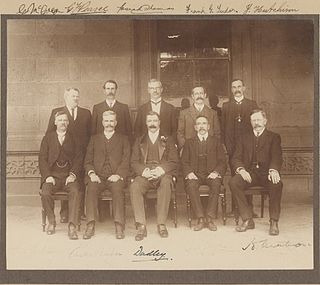
The First Fisher ministry (Labour) was the 6th ministry of the Government of Australia. It was led by the country's 5th Prime Minister, Andrew Fisher. The First Fisher ministry succeeded the Second Deakin ministry, which dissolved on 13 November 1908 after Labour withdrew their support and Alfred Deakin was forced to resign. The ministry was replaced by the Third Deakin ministry on 2 June 1909 after the Protectionist Party and the Anti-Socialist Party merged into the Liberal Party "fusion" and withdrew their support in order to form what became the first majority government in federal Australian history.
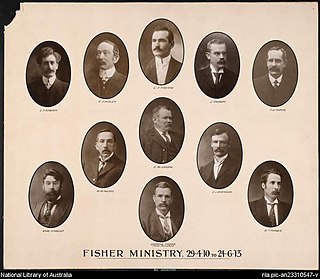
The Second Fisher ministry was the 8th ministry of the Government of Australia. It was led by the country's 5th Prime Minister, Andrew Fisher. The Second Fisher ministry succeeded the Third Deakin ministry, which dissolved on 29 April 1910 following the federal election that took place on 13 April which saw Labor defeat the Alfred Deakin's Liberal Party. It is the first federal government in Australian history to be elected with a majority in the House of Representatives, as well as the first majority national Labor government in the world. The ministry was replaced by the Cook ministry on 24 June 1913 following the federal election that took place in May which saw the Liberals defeat Labor.

Sir William John Lyne KCMG was an Australian politician who served as Premier of New South Wales from 1899 to 1901, and later as a federal cabinet minister under Edmund Barton and Alfred Deakin. He is best known as the subject of the so called "Hopetoun Blunder", unexpectedly being asked to serve as the first Prime Minister of Australia but proving unable to form a government.

Sir George Turner was an Australian politician. He served two terms as Premier of Victoria, holding office from 1894 to 1899 and 1900 to 1901 as a liberal. After Federation he was invited by Edmund Barton to join the inaugural federal ministry, becoming the first Treasurer of Australia. He held office until 1904 under Barton and Alfred Deakin, then a few months later resumed office under George Reid. The government fell in 1905 and Turner retired from politics at the 1906 election.
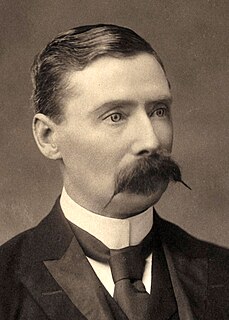
James George Drake, often cited as J. G. Drake, was an Australian politician. After a number of years in Queensland colonial politics, he was elected to the Senate at the first federal election in 1901. He subsequently held ministerial office under prime ministers Edmund Barton, Alfred Deakin, and George Reid, serving as Postmaster-General (1901–1903), Minister for Defence (1903), Attorney-General (1903–1904), and Vice-President of the Executive Council (1904–1905).
The Hopetoun Blunder was a political event immediately prior to the Federation of the British colonies in Australia.

Allan McLean was an Australian politician who served as the 19th Premier of Victoria, in office from 1899 to 1900. He was later elected to federal parliament, where he served as a government minister under George Reid.

John Henry Keating was an Australian politician who served as a Senator for Tasmania from 1901 to 1923. He held ministerial office in Alfred Deakin's second government, serving as Vice-President of the Executive Council (1906–1907) and Minister for Home Affairs (1907–1908).

The Barton government was the first federal executive government of the Commonwealth of Australia. It was led by Prime Minister Sir Edmund Barton, from 1 January 1901 until 24 September 1903, when Barton resigned to become one of the three founding judges of the High Court of Australia.

The first Deakin Government was the second federal executive government of the Commonwealth of Australia. It was led by Prime Minister Alfred Deakin, from 24 September 1903 until 27 April 1904. Deakin was the second Prime Minister of Australia, but served as Prime Minister again from 1905–1908 and 1909–1910 – see Second Deakin Government and Third Deakin Government.
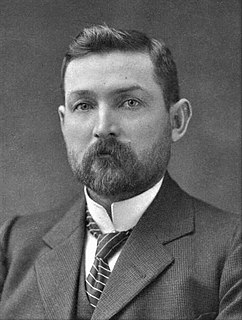
The Watson government was the third federal executive government of the Commonwealth of Australia. It was led by Prime Minister Chris Watson of the Australian Labor Party from 27 April 1904 to 18 August 1904. The Watson government was the first Labor Party national government in both Australia and in the world. Watson was aged just 37 when he became Prime Minister of Australia, and remains the youngest person to have held the post.

The Deakin government (1905–1908) refers to the period of federal executive government of Australia led by Prime Minister Alfred Deakin. It lasted from 5 July 1905 to 13 November 1908. Deakin was the second prime minister of Australia, having previously led the Deakin government (1903–1904), and held the office again in 1909–1910.


























